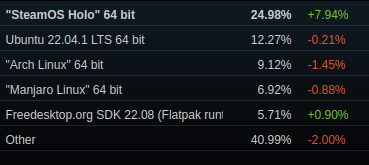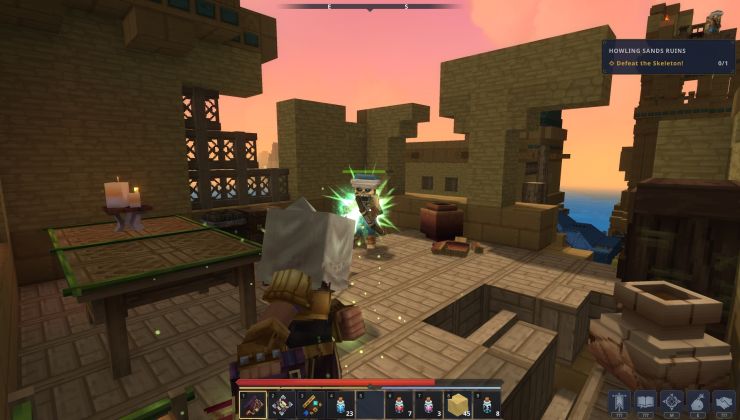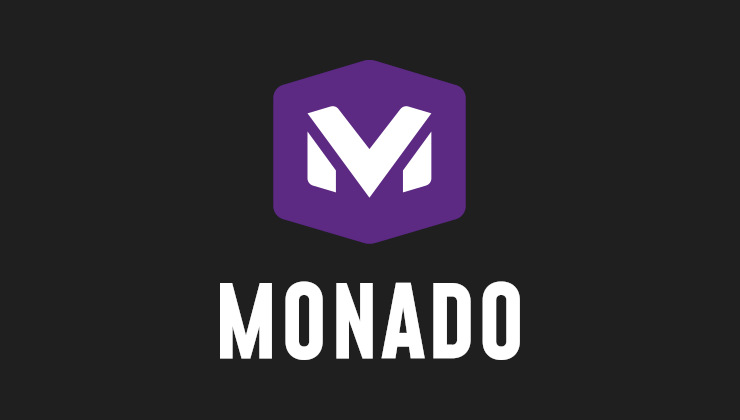Back in 2020 I pointed out what were the best Linux distributions for gaming, so here's the current state and what you should go for in 2023.
The thing is: not a lot has changed since my last article. Linux is still a minefield of many different distributions for people, and it can be very confusing. There's a lot of articles out there recommending really random and outdated distributions in lists too, so here's the real thing.
Without getting bogged down into packaging issues, and just giving you the basics of "this will work just fine" — go and install Ubuntu. People will (and I expect them to) argue for others, and people are free to, but a lot of people suggest other distributions for the wrong reasons. Manjaro has too many problems both technical and management, Arch can and will break things if you don't know exactly what you're doing, Fedora is messy with NVIDIA drivers and SELinux on Fedora is a nuisance and so on. Ubuntu is still to this day, the most simple distribution of Linux to install and get gaming.
Ubuntu isn't perfect by a long shot, but it remains as my number 1 choice to suggest to people both new and old to get into Linux and get gaming. It's one of the most used on desktop by any statistic you can find, which also means troubleshooting it is generally easier too.
With the Ubuntu LTS (long term support) releases, you also get support for at least 5 years, so you don't have the hassle and potential breakage of major system internal updates for quite a long time.
Valve's own stats show Ubuntu as one of the most popular too and it has been the same since Steam came to Linux.
As a user of Fedora myself, take it from me if you're in any way new to Linux: just go with Ubuntu. If you ever decide you "really know Linux now", then you can think about using something else. Don't make it difficult for yourself.
How might this change in future?
Well, Valve are here with the Steam Deck and SteamOS. Eventually, Valve will release SteamOS 3 so anyone can download it and install it. That might end up being a good pick, but right now it's not on the table as it's not released and anyone making their own version of it (like HoloISO and others) are too small to recommend serious use of them.
If you need help and support, specifically for Linux and also Steam Deck gaming, you can try asking in our Forum, Discord, IRC and Telegram.
Quoting: mr-victoryAs much as I'm excited about AV1, I've not done much with the AV1 encoders/decoders that exist today, so I really don't know if they are more space-efficient. Given that AV1 was developed quite some time after H.265, I would guess that its main competition is with H.266/VVC now. I'll have to try it out someday. Preferably with some hardware acceleration...Quoting: pleasereadthemanualIf you're wondering why H.265/HEVC (and now VVC) never got much adoption compared to its predecessor, this is why.I converted all of my videos to H265 back then with VLC and saved around %80-95 disk space. Do you think I should convert them to AV1, would I reclaim even more disk space? I don't care about patents because both Arch Linux and VLC just ignore their existence and ship all the codecs.
H.265 is a great codec. MPEG-LA made hundreds of millions of dollars developing the standards, after all. My hope is that AV1 can be even better without causing trouble for software developers everywhere.
As for why ffmpeg's x264/x265 can be freely used by free software media players that distribute their software to users like VLC, it has been suggested that France cares less about software patents than other countries (I don't know how true this is). I don't think MPEG-LA is interested in going after VideoLAN anyhow. ffmpeg themselves do not distribute binaries (only source code), so they are not infringing on any patents.
Quoting: itscalledrealityUbuntu sucks with is snap packages. Sorry new people but choose Arch or Manjaro (which the latter sucks because it’s so heavily Manjaro’d…I run Manjaro).Ehhh, if your main problem is Snap packages, then new people should go with Mint, which is a more user-friendly Ubuntu without Snaps.
Last edited by Kuduzkehpan on 2 Dec 2022 at 4:34 pm UTC
Quoting: GuestI've been deeply conflicted regarding all of the Manjaro discussion of late. For me personally, Manjaro has been hands down the best, most stable, and most-performant Linux choice I've made in over a decade on Linux at this point. Most of my and my household's (wife's, kids', elderly parents', work, etc) PC's have been running Manjaro with a variety of DE's flawlessly for years. I had lots of trauma with other distros (Ubuntu broke with every other major update and broken PPAs caused havoc; tons of gaming and wifi issues with Mint; the usual Arch drama with Antergos) and I moved over to Manjaro exclusively back at the dawn of DXVK when Manjaro was providing the rapidity of Nvidia updates needed to keep it working and I haven't regretted it. I've never had to reinstall a single system in my household, near 100% stability across machines (one CUPS issue a year or two ago pops to mind), and nearly every software install I've ever wanted to do has been easy-peasy via its package manager covering its own stable repositories, the AUR, or Flatpak. It's kernal installation and removal tool has been a lifesaver several times over. The Gnome setup tool mimicking various OS flavors has given every household member the custom interface they want. I've been very happy.Manjaro has too many problems both technical and managementI have a huge problem with Manjaro: other people tell me that Manjaro is bad, and the funny detail is those people don't use Manjaro anyway.
I've read all of the criticisms (from most not on the distro) and seen all the Youtube videos. The security lapses are head scratching and real and, if they really focus on it, probably easily addressed. The open/closed source ideological issues I give them a bigger pass on - As long as at the end of the day *I* have choice as to what I can install, I'll give them a lot of leeway to have flexibility to build a viable commercial enterprise which, so far, so good. And on the organization issues, well, I'm not passing judgement on that. As anyone who has spent any time in any company small, medium, or big knows, workplace drama is rife everywhere and Manjaro's issues wouldn't even raise eyebrows in my workplace. Just another day at the office.
I installed Fedora on a spare laptop, and it's fine, but I've needed to spend more time tinkering on that to get software found, downloaded, installed, and working on that laptop than on all of my home Manjaro PCs in total.
Warts and all, for now, Manjaro still remains my most recommended distro for medium-level Linux users (not beginners) <I duck getting ready for things to be thrown at me>.
Last edited by iiari on 2 Dec 2022 at 5:25 pm UTC
Anyway, you're all wrong. Obviously, the best linux distro for gaming in 2023 is Windows 11 with "Windows Subsystem for Linux" enabled. :woot:
Spoiler, click me
Last edited by BlackBloodRum on 2 Dec 2022 at 7:32 pm UTC
Quoting: sciroccoI use tumbleweed myself, for as long as it's been out. It was always a pain with nvidia simply because the new kernels where always ahead of patches nvidia had to make. Switching to amd was the best I ever did, so for myself I think tumbleweed is best,but I stand with my statement that Ubuntu is probably best out of the box for new users.Quoting: BumadarIf your an nvidia user I agree, it works better out of the box on them.Well only disto I can think of thats not good for an Nvidia user is Holoiso steamos.
If your an amd user then I feel there are more option as you can totally avoid closed source drivers.
I have a pretty slow gaming computer so I have to go for speed to reach 4k or atleast 4k with fsr or the like, so atm I am running ChimeraOS and CachyOS, they are both great for speed in games, ChimerOS is the fastest I have tried, however its a bit too locked down for daily driver usage.
Honestly with how convenient Arch has been for gaming considering that that's what steamos is based on I would suggest just using Arch.
Quoting: Liam Dawe...pointing people towards tiny random distributions that could vanish at any point is not going to help Linux and Linux Gaming in the long run. If I'm going to put my reputation on a recommendation for a distribution, it's going to be one with a long history of support and good backing. Hopefully that makes sense.Understandable point. However experiences like this:
Quoting: Blender-samaI have to say that my experience with Nobara is very good. I tried Ubuntu and POP.OS with both I had problems with gaming.And [famously this](https://youtu.be/0506yDSgU7M) (Linus Tech Tips on YouTube) are arguably not going to help Linux gaming in the long run either (or the short run for that matter).
It's possible that an "it just works" out-of-the-box experience, especially for newcomers to the ecosystem, would be the best possible thing for promoting Linux gaming at large.
Maybe there could be a "Best Gaming Distros for Beginners" list, or an annual "Best Distros for Gaming in 20xx" list, which can be updated each year to drop distros if they become unsupported.
As an aside, Pop_Os! is not exactly tiny or random either, as it's backed by a company and sits at #5 on DistroWatch.org, higher than Ubuntu, Fedora, and Debian. As others have mentioned, it offers painless Nvidia support out-of-the-box which, while bad for FOSS purists, is good for Windows refugees and the FOSS curious.
For everyone who has a good experience on anything, there will be someone saying they had a bad experience. That’s just life and doesn’t change my opinion that Ubuntu is the best starting point for most people.
Quoting: kaktuspalmeIf Ubuntu did Mesa and Kernel updates, I would put it on top. But without it I wouldn't recommend it, at least to AMD GPU users.They do.
https://wiki.ubuntu.com/Kernel/LTSEnablementStack
Quoting: CatKillerYes, but a user has to enable it. That's too much for a regular computer user to ask for.Quoting: kaktuspalmeIf Ubuntu did Mesa and Kernel updates, I would put it on top. But without it I wouldn't recommend it, at least to AMD GPU users.They do.
https://wiki.ubuntu.com/Kernel/LTSEnablementStack
Quoting: kaktuspalmeYes, but a user has to enable it. That's too much for a regular computer user to ask for.No they don't. Installs that come with a desktop environment are on HWE by default. Headless server installs are not on HWE by default.
Quoting: CatKillerOh I just see that since 20.04 they enable it by default. That's nice!Quoting: kaktuspalmeYes, but a user has to enable it. That's too much for a regular computer user to ask for.No they don't. Installs that come with a desktop environment are on HWE by default. Headless server installs are not on HWE by default.
Sorry, I just saw that also non LTS-Ubuntu Kernels and Mesa will be used. I have to rethink the recommendation for distributions then.
But 7000 Series User will probably still have to wait until April 2023. But for sure a big improvement to how they handled it before.
Last edited by kaktuspalme on 3 Dec 2022 at 9:11 am UTC
Obviously users can manually choose to use [mainline kernels](https://wiki.ubuntu.com/Kernel/MainlineBuilds) and [new Mesa from a PPA](https://launchpad.net/~kisak/+archive/ubuntu/kisak-mesa) if they want stuff faster than it comes through the Hardware Enablement process, but they'll get them in time, regardless.
It would obviously be easier if AMD could get their support lined up ready before they release their hardware, like Intel (and Nvidia) do. I understand they're not quite as bad at this as they used to be, but still not as good as their competitors.
Last edited by CatKiller on 3 Dec 2022 at 9:24 am UTC
Quoting: pleasereadthemanualAs for why ffmpeg's x264/x265 can be freely used by free software media players that distribute their software to users like VLC, it has been suggested that France cares less about software patents than other countries (I don't know how true this is).It's true. France couldn't care less, since there are no software patents in the European Union. This is not country-specific or a softer attitude, but an explicit rejection of the entire concept of software patents. Nobody pays software patent fees here.















 How to setup OpenMW for modern Morrowind on Linux / SteamOS and Steam Deck
How to setup OpenMW for modern Morrowind on Linux / SteamOS and Steam Deck How to install Hollow Knight: Silksong mods on Linux, SteamOS and Steam Deck
How to install Hollow Knight: Silksong mods on Linux, SteamOS and Steam Deck